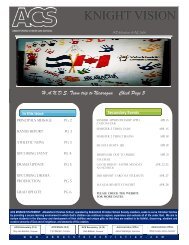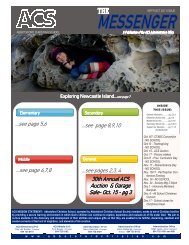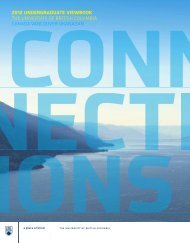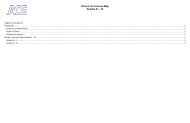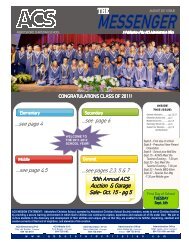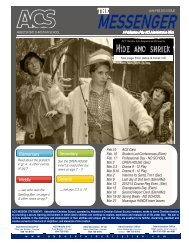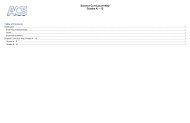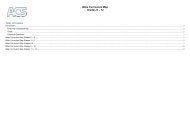Social Studies Curriculum Map - Abbotsford Christian School
Social Studies Curriculum Map - Abbotsford Christian School
Social Studies Curriculum Map - Abbotsford Christian School
You also want an ePaper? Increase the reach of your titles
YUMPU automatically turns print PDFs into web optimized ePapers that Google loves.
<strong>Social</strong> <strong>Studies</strong> <strong>Curriculum</strong> <strong>Map</strong><br />
Grades K – 12<br />
Table of Contents<br />
Introduction ..................................................................................................................................................................................................................................................................................................................................... 2<br />
Enduring Understandings ............................................................................................................................................................................................................................................................................................................ 2<br />
<strong>Social</strong> <strong>Studies</strong> .......................................................................................................................................................................................................................................................................................................................... 2<br />
Goals: .......................................................................................................................................................................................................................................................................................................................................... 2<br />
Essential Questions ..................................................................................................................................................................................................................................................................................................................... 2<br />
<strong>Social</strong> <strong>Studies</strong> <strong>Curriculum</strong> <strong>Map</strong> Grades K – 12 ............................................................................................................................................................................................................................................................................... 3<br />
Grades 6 - 8 ............................................................................................................................................................................................................................................................................................................................. 3<br />
Grades 9 - 12 ........................................................................................................................................................................................................................................................................................................................... 6
Introduction<br />
Mission Statement<br />
<strong>Abbotsford</strong> <strong>Christian</strong> <strong>School</strong>, operated by <strong>Abbotsford</strong> <strong>Christian</strong> <strong>School</strong> Society members, seeks to serve <strong>Christian</strong> families by providing a secure learning environment in which God’s<br />
children can continue to explore, experience and evaluate all of life under God.<br />
We aim to nurture students in the discovery and development of their abilities and unique gifts so that they are enabled to be faithful, discerning, obedient and creative servants of God and<br />
of neighbour; and stewards of His creation.<br />
Enduring Understandings<br />
<strong>Social</strong> <strong>Studies</strong><br />
<strong>Social</strong> <strong>Studies</strong> ( History, Geography, Economics, Political Science, Sociology, anthropology) teach students about human relationships and actions—today and in the past—so that they live as citizens of God’s kingdom in<br />
their own community. They learn about their own culture, as well as cultures in other parts of the world and in different time periods. <strong>Social</strong> studies in <strong>Christian</strong> schools recognize that God created people to develop and<br />
take care of the creation. In response, people have developed many different cultures that have religious frameworks that accept God as Creator and Lord, or worship other gods and/or aspects of the creation. Sin distorts<br />
human cultural development. Yet, through the renewal that Christ’s redemption brings, students can understand and learn to be culture formers themselves. Students learn that all people are called to live justly, love<br />
mercy and walk humbly with God as they live in their families and communities. They develop a sense of place and sense of time that is guided by principles of service, mercy, peace, justice and stewardship.<br />
Goals:<br />
1. Enable students to live as disciples of Jesus Christ and citizens of the Kingdom of God. As citizens in his Kingdom we are called to be culture formers guided by the principles of service, mercy, peace, justice and<br />
stewardship<br />
2. Understand and prepare to exercise their roles, rights, and responsibilities within their family, the community, Canada, and the world<br />
3. Demonstrate respect for human equality and cultural diversity<br />
4. Acquire an understanding of and appreciation for the historical and geographical forces that have shaped and continue to shape Canadian society and the societies of countries around the world<br />
5. Develop the skills and attitudes necessary to become thoughtful, active participants in their communities and as global citizens<br />
6. Think critically, evaluate information and practise effective communication<br />
Essential Questions<br />
1. How can I live as a citizen of the Kingdom of God in the community in which he has place me?<br />
2. What are my roles, rights, and responsibilities in my family, community, country and the world?<br />
3. How can I appreciate and respect people’s differences?<br />
4. What are the forces that have shaped and continue to shape my society and the societies of other places?<br />
5. How can I participate actively and thoughtfully in my community and my world?<br />
6. How can I think critically, evaluate information and practice effective communication?
<strong>Social</strong> <strong>Studies</strong> <strong>Curriculum</strong> <strong>Map</strong> Grades K – 12<br />
For Grades K – 5 please see the Thematic <strong>Studies</strong> <strong>Curriculum</strong> <strong>Map</strong><br />
Grades 6 - 8<br />
Planning for Assessment (Teaching Strategies), Assessment Indicators (Assessment Activities) and resources are listed in course overviews<br />
Grade Essential Questions/Unit Questions Content Learning Outcomes: By the end of grade level, the students will: Special Events:<br />
Field Trips, Service Projects, Speakers,<br />
Culminating Activities, Simulations, etc.<br />
6 Canada and the World<br />
One World, Many Cultures<br />
What makes us one world? What are its<br />
characteristics?<br />
o What tools can we use to help us learn<br />
more about the order in God’s world?<br />
(maps, charts, graphs, etc.)<br />
<br />
<br />
<br />
<br />
What makes us a diverse world? How does<br />
culture shape us?<br />
How does learning about the world and its people<br />
help me to be a faithful citizen in God’s kingdom<br />
(on earth)?<br />
What is the relationship between culture and<br />
natural environment?<br />
What skills do I need to develop in order to build<br />
and express my understanding of the world and<br />
its cultures? ( LA – oral communication, reading,<br />
writing)<br />
Global Awareness<br />
What are the causes of poverty?<br />
Why is it so difficult for many people to escape<br />
the poverty cycle?<br />
How is Canada the same as and different from<br />
“developing countries” in the areas of<br />
government, environment, economics, and<br />
natural resources?<br />
How does God call us as global citizens and<br />
citizens of the kingdom of God to respond to<br />
global issues?<br />
Canada and the World<br />
One World, Many Cultures<br />
God created a culturally and geographically diverse world in which we are to live in<br />
communion with Him and in unity with one another.<br />
Cultural diversity is a gift from God to be understood, explored, experienced, and<br />
celebrated.<br />
People worldwide meet similar needs in varying ways and experience life within the<br />
bounds of their natural environment and cultural worldview.<br />
We can more fully understand culture(s) by engaging in human interaction and<br />
through the study of a variety of media, including music, art, and literature.<br />
In depth study of:<br />
o World mapping<br />
o Stories and folk tales from around the world<br />
o Amish Adventure - novel study<br />
o Canadian culture - multiculturalism, equality and rights,<br />
o Japan<br />
o Independent research on a country<br />
o Independent novel study<br />
Global Awareness<br />
Our world and all who live in it belong to God..<br />
We have a responsibility to be aware of the critical issues affecting the global<br />
community.<br />
We are called to be active agents for change, exploring and promoting solutions to<br />
global issues<br />
We pursue restoration of our world by participating in the Rice Raiser<br />
In depth study of:<br />
o The Global Village<br />
o Comparison of Canada with developing countries<br />
o Africa<br />
o The United Nations<br />
Skills and Processes of <strong>Social</strong> <strong>Studies</strong><br />
A1 apply critical thinking skills – including comparing, classifying, inferring, imagining, verifying,<br />
identifying relationships, summarizing, and drawing conclusions – to a range of problems and<br />
issues<br />
A2 interpret graphs, tables, aerial photos, and various types of maps<br />
A3 evaluate the credibility and reliability of selected sources<br />
A4 deliver a formal presentation<br />
A5 implement a plan of action to address a selected local or global problem or issue<br />
Identity, Society, and Culture<br />
B1 assess diverse concepts of Canadian identity<br />
B2 compare Canadian society with the society of another country<br />
B3 relate a society’s artistic expression to its culture<br />
Governance<br />
C1 compare the federal government in Canada with national governments of other countries<br />
C2 describe key characteristic of the justice system in Canada<br />
C3 assess equality and fairness in Canada with reference to the Canadian Charter of Rights and<br />
Freedoms<br />
C4 compare individual and collective rights and responsibilities in Canada with those in other<br />
countries<br />
C5 describe the role of Canada in the world<br />
Economy and Technology<br />
D1 describe the importance of trade for BC and Canada<br />
D2 analyse the significance of communications technologies in Canada<br />
D3 evaluate effects of technology on lifestyles and environments<br />
D4 compare Canada’s economy, technology, and quality of life with those in one or more selected<br />
countries<br />
Human and Physical Environment<br />
E1 assess the relationship between cultures and their environments<br />
E2 describe factors that affect settlement patterns and population distribution in selected countries<br />
Canada and the World<br />
China Town field trip<br />
Culminating Cultural Fair (invite parents and<br />
community members<br />
Guest speakers from various cultural groups<br />
Global Awareness<br />
Speeches on Aid Organizations<br />
Rice Raiser<br />
Invite Speakers to class (people who have<br />
lived in or travelled to Africa or other<br />
developing nations)<br />
7 Ancient Civilizations<br />
Archaeology<br />
How can we discover and know about people in<br />
ancient civilizations?<br />
How can we use sources to verify the accuracy of<br />
information?<br />
What is the difference between a fact and an<br />
opinion?<br />
How can I take notes and write non-fiction<br />
paragraphs?<br />
Introduction to Civilizations<br />
Why do people civilize?<br />
Why do civilizations rise and fall?<br />
How does God want his people to live in<br />
community?<br />
Ancient Civilizations<br />
Archaeology<br />
What is archeology?<br />
How can we know about the past?<br />
How can we use sources to find and infer accurate information?<br />
How do Archeologists find information?<br />
What is it like to dig through layers and put together evidence to form opinions?<br />
Introduction to Civilizations<br />
What is a civilization?<br />
Sumer<br />
Assyria<br />
Babylon<br />
Create Your Own Civilization Project<br />
Skills and Processes of <strong>Social</strong> <strong>Studies</strong><br />
A1 apply critical thinking skills – including comparing classifying, inferring, imagining, verifying,<br />
using analogies, identifying relationships, summarizing, and drawing conclusions, - to a range of<br />
problems and issues<br />
A2 use various types of graphs, tables, timelines, and maps to obtain or communicate information<br />
A3 compile a body of information from a range of sources<br />
A4 deliver a formal presentation on a selected issue or inquiry using two or more forms of<br />
representation<br />
A5 defend a position on a contemporary or historical issue<br />
Identity, Society, and Culture<br />
B1 analyse the concept of civilization as it applies to selected ancient cultures<br />
B2 analyse social roles within one or more ancient civilizations<br />
B3 identify influences and contributions of ancient societies to present-day cultures<br />
Governance<br />
C1 describe the evolution and purpose of rules, laws, and government in ancient civilizations<br />
C2 assess how ancient systems of laws and government have contributed to current Canadian<br />
Archeology<br />
Clayburn Brick Factory exploration<br />
Jonas Enns – archeologist – speaker<br />
Dig site<br />
Ancient Greece<br />
Greek culture parent-student night?
What causes change?<br />
Create Your Own Civilization Project<br />
What makes a civilization successful?<br />
How do maps help us know about physical<br />
environment?<br />
How does environment play a role in the<br />
development of a civilization?<br />
How did civilizations develop?<br />
Ambassador Project<br />
How have the ancient civilizations of Egypt, Maya<br />
and China influenced the world today?<br />
How did their environment affect their<br />
development?<br />
What were the successes and downfalls of these<br />
civilizations?<br />
How did their religious beliefs shape their culure<br />
and how do they compare to our <strong>Christian</strong><br />
beliefs?<br />
Ancient Greece<br />
Where is Ancient Greece?<br />
How does a civilization’s geography affect unity?<br />
How is <strong>Christian</strong>ity similar or different from that of<br />
Greek Religion?<br />
What contributions did Ancient Greece make to<br />
the world as we know it today?<br />
How did the people or influence of Helenism<br />
affect <strong>Christian</strong>ity?<br />
Environment<br />
<strong>Map</strong>ping<br />
Resources<br />
Cultural Development<br />
Culminating POL (Presentation of Learning)<br />
Ambassador Project<br />
Introduction<br />
Geography<br />
Religion<br />
Successes and Downfalls<br />
Ancient Greece<br />
Introduction<br />
Geography<br />
Timeline<br />
City States<br />
Government<br />
Contributions<br />
Famous Wars<br />
Famous Greeks<br />
Ancient Rome<br />
Geography<br />
Rome the Republic: Early Rome (800 – 100 BC)<br />
The Golden Age of Rome (100 BC – 450 AD)<br />
The Break- up of an Empire<br />
Everyday life<br />
Innovations and Inventions<br />
Roman Leaders (optional extension activity)<br />
political and legal systems<br />
Economy and Technology<br />
D1 describe various ways ancient peoples exchanged goods and services<br />
D2 assess ways technological innovations enable ancient peoples to<br />
- adapt to and modify their environments<br />
- satisfy their needs<br />
- increase exploration and trade<br />
- develop their cultures<br />
D3 compare ancient and modern communications media<br />
Human and Physical Environment<br />
E1 assess how physical environments affected ancient civilizations<br />
E2 identify the impact of human activity on physical environments in ancient civilizations<br />
Ancient Rome<br />
How did geography if Ancient Rome affect its<br />
development?<br />
What are the similarities and differences between<br />
Ancient Greek and Roman Civilizations?<br />
What contributions did Ancient Rome make to the<br />
world as we know it today?<br />
Why did God choose to send Jess to that<br />
particular time and place?<br />
8 World Civilizations 500 – 1600<br />
<strong>Map</strong>ping<br />
Why is it important that I know about the world?<br />
Who am I in relation to the world I live in?<br />
How do longitude and latitude affect the earth?<br />
Middle Ages - The Establishment of Christendom<br />
What causes kingdoms to rise and fall?<br />
What role does <strong>Christian</strong>ity play in the forming<br />
kingdoms?<br />
How do I play out my role in God’s kingdom?<br />
The Renaissance<br />
Why is it important to pursue truth?<br />
What are the consequences of pursuing truth?<br />
How do people’s convictions influence their lives?<br />
Who are people that make a difference?<br />
World Religions<br />
How did the major World Religions find their<br />
beginnings?<br />
How do the beliefs of many World Religions<br />
World Civilizations 500 – 1600<br />
<strong>Map</strong>ping<br />
the world<br />
Canada<br />
The Middle East<br />
Europe<br />
Middle Ages – The Establishment of Christendom<br />
God controls the rise and fall of kingdoms and nations.<br />
The history of nations is dependent on their responses to God and his people.<br />
God holds believers responsible for fitting into His plan and being his instruments.<br />
The Renaissance<br />
How can the pursuit of truth lead to change?<br />
How do people’s convictions influence their lives?<br />
Who are people who make a difference?<br />
World Religions<br />
Overview of world religions<br />
Islam – monotheistic<br />
Applications of <strong>Social</strong> <strong>Studies</strong><br />
identify and clarify a problem, an issue, or an inquiry<br />
gather and organize a body of information from primary and secondary proint and non-print<br />
sources, including electronic sources<br />
interpret and evaluate a variety of primary and secondary sources<br />
assess a variety of positions on controversial issues<br />
plan, revise, and deliver written and oral presentations<br />
cooperatively plan and implement a course of action that addresses the problem, issue, or<br />
inquiry initially identified<br />
Society and Culture:<br />
identify factors that influence the development and decline of world civilizations<br />
compare daily life, family structures, and gender roles in a variety of civilizations<br />
describe a variety of diverse cultural traditions and world religions<br />
demonstrate awareness of artistic expression as a reflection of the culture in which it is<br />
produced<br />
identify periods of significant cultural achievement, including the Renaissance<br />
describe how societies preserve identity, transmit culture, and adapt to change<br />
Politics and Law:<br />
demonstrate understanding of the tension between individual rights and the responsibilities of<br />
citizens in a variety of civilizations<br />
Middle Ages<br />
Monastery Field Trip<br />
Medieval Fair/Feast<br />
Castle Building Days<br />
The Renaissance<br />
Renaissance Presentations<br />
Visit the Art Gallery<br />
World Religions<br />
Possible Field trips to local churches, temples,<br />
synagogues, mosques, etc.<br />
Speakers: pastors from different kinds of<br />
churches<br />
Taking a Stand<br />
Here I Stand Project display<br />
Interview their pastor/minister
compare to <strong>Christian</strong>ity?<br />
What can I learn about <strong>Christian</strong>ity through the<br />
study of different religions?<br />
Taking a Stand<br />
How do people’s beliefs influence their lives?<br />
What are the characteristics of individuals who<br />
make a difference/<br />
What kind of stand does Christ call us to take?<br />
How can I demonstrate how my faith and learning<br />
unite?<br />
How can I take a stand for something I believe?<br />
Judaism – monotheistic<br />
Eastern Religions and Disbelief<br />
Taking a Stand<br />
The Reformation<br />
“Here I Stand” - project<br />
<br />
<br />
<br />
assess the impact of contact, conflict, and conquest on civilizations<br />
describe various ways individuals and groups can influence legal systems and political<br />
structures<br />
explain the development and importance of government systems<br />
Economy and Technology:<br />
compare basic economic systems and different forms of exchange<br />
analyse the effect of commerce on trade routes, settlement patterns, and cultural exchanges<br />
compare the changing nature of labour in rural and urban environments<br />
describe the impact of technological innovation and science on political, social, and economic<br />
structures<br />
Environment:<br />
construct, interpret, and use graphs, tables, grids, scales, legends, and various types of maps<br />
locate and describe major world landforms, bodies of water, and political boundaries on maps<br />
locate and describe current and historical events on maps<br />
describe how physical geography influenced patterns of settlement, trade, and exploration<br />
analyse how people interacted with and altered their environments, in terms of<br />
o population<br />
o settlement patterns<br />
o resource use<br />
o cultural development
Grades 9 - 12<br />
Planning for Assessment (Teaching Strategies), Assessment Indicators (Assessment Activities) and resources are listed in course overviews<br />
Grade Essential Questions / Unit Questions Content Learning Outcomes: By the end of grade level, the students will: Special Events:<br />
Field Trips, Service Projects, Speakers,<br />
Culminating Activities, Simulations, etc.<br />
9 Europe and North America 1500 – 1815 Humans Europe and North America 1500 – 1815 Humans Struggle to be Free<br />
Applications of <strong>Social</strong> <strong>Studies</strong><br />
Struggle to be Free<br />
1. Early Modern Era<br />
identify and clarify a problem, an issue, or an inquiry<br />
1. Early Modern Era<br />
Science and technology challenged religion as the ultimate authority in society during select and summarize information from primary and secondary print and non-print sources,<br />
How does science and technology impact<br />
society?<br />
<br />
the Early Modern Era.<br />
Humanism is a system or mode of thought in which human interests dominate. <br />
including electronic sources<br />
assess the reliability, currency, and objectivity of different interpretations of primary and<br />
<br />
<br />
What are the catalysts for changes?<br />
Are societies progressing (moving forward) over<br />
time?<br />
2. The Fight for Democracy and the English Civil<br />
War<br />
What form of government is most effective?<br />
How can societies ensure a fair balance of<br />
power?<br />
How can societies protect their rights and ensure<br />
their liberties?<br />
3. French Revolution<br />
How can one deal with injustices appropriately<br />
What form of government is most effective?<br />
What makes a great leader?<br />
4. Napoleonic Era<br />
How should history remember Napoleon?<br />
Does Napoleon meet the criteria of a good<br />
leader?<br />
Do Napoleon’s contributions to French society<br />
outweigh the negative act he committed?<br />
5. Industrial Revolution<br />
How do changes in technology impact society?<br />
What rights and privileges should be guaranteed<br />
for all workers?<br />
What lessons can be learned from the events of<br />
the Industrial Revolution to address similar issues<br />
in the third world?<br />
6. Regional Geography of Canada<br />
How does geography influence a region’s<br />
culture?<br />
How are the boundaries of a region or territory<br />
formed?<br />
What are Canada’s distinguishing geographical<br />
features?<br />
7. The Native Peoples of Canada<br />
What can be learned about a group of people<br />
using anthropology?<br />
What do traditions and rituals teach about<br />
culture?<br />
How does region/physical geography affect<br />
lifestyle?<br />
8. Arrival in Canada<br />
How did European contact with the New World<br />
bring about change?<br />
Why does racism exist?<br />
How does history unfold itself in present day<br />
<br />
<br />
A <strong>Christian</strong> worldview places Christ and his teachings at the centre of all life and<br />
provides the ultimate authority for truth.<br />
Various forms of cultural expression reflect the society in which they are created.<br />
2. The Fight for Democracy and the English Civil War<br />
The economic disparity that existed in England during this time can be seen today in<br />
many Third World countries.<br />
Many of Canada’s liberties are rooted in England’s democratic legacy.<br />
Canada’s parliamentary system empowere Canadian citizens to have a voice ( a say<br />
in running the country).<br />
Absolute power corrupts absolutely.<br />
3. French Revolution<br />
The ideals of the French Revolution advanced the cause of freedom in Europe and<br />
the World.<br />
A populace movement, such as the French Revolution, has the potential to bring<br />
about great good or evil.<br />
Societies destabilize when wealth and power rest in the hands of a privileged few.<br />
4. Napoleonic Era<br />
<strong>Christian</strong>s measure successful leadership differently from secular culture.<br />
Leadership is most effective when it is servant oriented.<br />
Nationalism is a potent force in the world, holding the potential to bring great harm<br />
upon a nation and its citizens.<br />
5. Industrial Revolution<br />
Technology is in a constant state of change, causing society to change with it.<br />
It is the moral obligation of employers to provide their workers with a safe working<br />
environment.<br />
The economic disparity and social injustice that existed during the Industrial<br />
Revolution continues today in many third world nations.<br />
6. Regional Geography of Canada<br />
There is an unbreakable link between the land and the people who inhabit it.<br />
Physical landforms, climate, industry, economics, and politics work together to play a<br />
role in the creation of various regions.<br />
Canada’s history has been shaped by geography and regional issues.<br />
7. The Native Peoples of Canada<br />
Anthropology reveals the rich diversity of various human groupings<br />
Culture can be expressed in many ways.<br />
There is an essential link between human beings and the land in which they live.<br />
8. Arrival in Canada<br />
European contact with natives in the new World brought many benefits and<br />
challenges to both parties.<br />
Human nature predisposes people to discriminate against others based on<br />
differences.<br />
Many of the current social challenges facing Native communities are rooted in<br />
historical events.<br />
The Gospel message transcends boundaries of culture, race and status and should<br />
therefore take many forms of expression.<br />
<br />
<br />
<br />
secondary sources<br />
defend a position on a controversial issue after considering a variety of perspectives<br />
plan, revise, and deliver formal oral and written presentations<br />
co-operatively plan, implement, and assess a course of action that addresses the problem,<br />
issue, or inquiry initially identified<br />
Society and Culture:<br />
analyse the relationship between Aboriginal people and Europeans and explain the role of<br />
each in the development of Canada<br />
describe daily life in Aboriginal communities, New France, and British North America<br />
assess how identity is shaped by a variety of factors, including:<br />
o family<br />
o gender<br />
o belief systems<br />
o ethnicity<br />
o nationality<br />
describe how different forms of artistic expression reflect the society in which they are<br />
produced<br />
analyse roots of present-day regional, cultural and social issues within Canada<br />
Politics and Law:<br />
define colonialism, imperialism, and nationalism<br />
analyse factors that contribute to revolution and conflict<br />
analyse the contributions of the English, French, and American revolutions in the<br />
development of democratic concepts<br />
investigate the roots of Canada’s political and legal systems, including the development of<br />
two legal systems from two cultures<br />
evaluate the changing nature of law and its relation to social conditions of the times<br />
Economy and Technology:<br />
assess how economic systems contributed to the development of early Canada<br />
analyse reasons for the initial exploration and settlement of North America<br />
analyse effects of colonialism on trade and conflict<br />
assess the impact of the fur trade on exploration and settlement<br />
identify factors that influenced growth and development of industry<br />
evaluate the effects of the Industrial Revolution on society and the changing nature of work<br />
Environment:<br />
construct, interpret, and use graphs, tables, grids, scales, legends, contours, and various<br />
types of maps<br />
describe and compare North America’s diverse geographical regions<br />
identify major exploration routes and historical events in the development of Canada<br />
demonstrate understanding of the ways in which Aboriginal people interact with their<br />
environment<br />
explain the role of Aboriginal people in the fur trade and in the exploration of North America<br />
assess the role of geographical factors in the development of trade and settlement in Canada<br />
and other colonies<br />
<br />
<br />
Mock trial of Charles<br />
Students create an interactive museum exhibit<br />
that showcases the link between their<br />
assigned Native group and the region of<br />
Canada from which they originate. This<br />
presentation of learning is done in<br />
collaboration with the grade 4 teachers<br />
(students provide audience).
issues?<br />
What lessons can be learned from the<br />
experiences of past missionaries?<br />
9. Canada Moves West<br />
What role did the fur trade play in Canada’s<br />
development?<br />
Who was involved in the fur trade?<br />
What were the sources of conflict in the fur trade?<br />
What led to the discovery of the vast interior and<br />
west coast of Canada?<br />
9. Canada Moves West<br />
The fur trade was the primary economy of New France, the royal colony which would<br />
later become the nation of Canada.<br />
The fur trade was a complex partnership requiring the cooperation of both Natives and<br />
Europeans.<br />
Conflicts are inevitable in all business arrangements. Some are resolved, others are<br />
not.<br />
Necessity, curiosity, and greed all contributed to the discovery of new lands.<br />
10 Canada 1815 - 1914<br />
The Geography of Western Canada<br />
What are the five themes of geography?<br />
What are the different physical and natural<br />
regions in Western Canada?<br />
What is the impact of humans on the<br />
environment?<br />
Canada 1815 - 1914<br />
The Geography of Western Canada<br />
- The Importance of Place<br />
- The Physical Regions of Canada<br />
- The Climates of Western Canada<br />
- The Natural Regions of Western Canada<br />
- The Cultural Landscape<br />
Skills and Processes of <strong>Social</strong> <strong>Studies</strong><br />
A1 apply critical thinking skills, including<br />
- questioning<br />
- comparing<br />
- summarizing<br />
- drawing conclusions<br />
- defending a position<br />
<br />
Field Trip – Gas Town and China Town<br />
Colonies in the Wilderness<br />
How does the geography play a role in Canada’s<br />
early development?<br />
What are the important political and social<br />
changes in the history of Upper Canada?<br />
What were the reasons for political discontent in<br />
Lower Canada?<br />
Building a Nation 1840 – 1867<br />
What was the process that led to Confederation?<br />
Which individuals and events were important in<br />
Canada’s pre-Confederation history?<br />
The Northwest to 1870<br />
How did the fur trade impact the Native people of<br />
the Northwest?<br />
What were the causes and key events of the Red<br />
River Rebellion?<br />
The Prairies, 1870 – 1896<br />
What was the impact of Canadian policy on Metis<br />
settlement and self-government?<br />
How did the National Policy impact different parts<br />
of the country?<br />
British Columbia to 1896<br />
What were the reasons for the creation of<br />
Vancouver Island and the Mainland?<br />
What were the main points of view concerning<br />
the entry of BC into Confederation?<br />
The Emergence of Modern Canada, 1896 – 1914<br />
What were the factors influencing nationalist and<br />
imperialist sentiment in Canada?<br />
What was the impact of social change on women,<br />
Native Peoples, and immigrants?<br />
The Economy of BC<br />
What are the main economic divisions of BC?<br />
What role does geography play in the economy of<br />
BC?<br />
The Economy of Canada<br />
How do Canada’s economic sectors and regions<br />
play a role in the economy of Canada?<br />
Colonies in the Wilderness<br />
- The Land of Yesterday<br />
- Upper Canada<br />
- The Immigrant Experience<br />
- Colonial Government and the Need for Reform<br />
Building a Nation 1840 – 1867<br />
- The Victorian Era<br />
- A New Age of Science and Medicine<br />
- Leisure and Travel<br />
- Building a Nation<br />
- Confederation<br />
- BNA Act<br />
The Northwest to 1870<br />
- HBC and NWC<br />
- Red River Settlement<br />
The Prairies, 1870 – 1896<br />
- The Metis Move to the Northwest<br />
- The First Nations Peoples in the Northwest<br />
- The National Dream<br />
- The Northwest Rebellion<br />
British Columbia to 1896<br />
- The Oregon Territory<br />
- The Colony of Vancouver Island<br />
- The Cariboo Gold Rush<br />
- The Colony of British Columbia<br />
- The Emergence of Vancouver<br />
- The Chinese in British Columbia<br />
The Emergence of Modern Canada, 1896 – 1914<br />
- A French-English Split<br />
- The Laurier Boom<br />
- The Rise of Unions<br />
- Immigration issues<br />
- Women and Native Reform<br />
- Wonders of the Laurier Age<br />
The Economy of British Columbia<br />
- The Forest<br />
- Fisheries and Water<br />
- Agriculture<br />
- Non-Renewable Resources<br />
- Tourism<br />
A2 demonstrate effective research skills, including<br />
- accessing information<br />
- assessing information<br />
- collecting information<br />
- evaluating information<br />
- organizing information<br />
- presenting information<br />
- citing sources<br />
A3 demonstrate effective written, oral, and graphic communication skills<br />
Identity, Society, and Culture<br />
B1 analyse Canadian society from 1815 to 1914 in terms of gender roles, ethnicity, daily life, and<br />
the arts<br />
B2 evaluate the impact of interactions between Aboriginal peoples and European explorers and<br />
settlers in Canada from 1815 to 1914<br />
B3 evaluate the influence of immigration on Canadian society from 1815 to 1914<br />
B4 describe the factors that contributed to a changing national identity from 1815 to 1914<br />
Governance<br />
C1 describe the evolution of responsible government in Canada in terms of government structure<br />
and key contributing events<br />
C2 analyse political, economic, social, and geographical factors that led to Confederation and to<br />
the development of Canada’s provinces and territories<br />
C3 describe the events of the Red River and Northwest Rebellions<br />
C4 describe the structure and function of Canada’s federal, provincial, and local governments<br />
Economy and Technology<br />
D1 assess the impact of Macdonald’s National Policy on Canada<br />
D2 analyse the influence of the following on Canada’s economy from 1815 to 1914<br />
- resource development and decline<br />
- technology innovations<br />
D3 describe the development of British Columbia’s economy from 1815 to 1914<br />
Human and Physical Environment<br />
E1 describe the physiographic regions of Canada and the geological processes that formed these<br />
regions<br />
E2 analyse how geography influenced the economic development on settlement patterns in<br />
regions of Canada from 1815 to 1914<br />
E3 evaluate attitudes and practices in resource development in British Columbia fro 1815 to 1914<br />
and their impact on contemporary resource management<br />
Human Geography – Grade 11 (taught in grade 10, reviewed in grade 11)<br />
explain the significance of changes in world population with reference to<br />
o population pyramids<br />
<br />
Board Game – students show what they have<br />
learned in Human Geography – terms,
Human Geography (SS 11)<br />
How can we make it easier to live with billions of<br />
people?<br />
Why should we be thankful for what we have?<br />
What can we do to be good stewards of God’s<br />
provisions?<br />
The Economy of Canada<br />
- The Changing Economy<br />
- Economic Essentials<br />
- Canada’s Economic Regions<br />
- An Overview of Canada-US Relations<br />
- Freer Trade in North America<br />
Human Geography (SS 11)<br />
- World Population Growth, Demography, The demographic Revolution<br />
- The Age Structure of Populations<br />
- One-Child Policy Case Study, Where do Six Billion People Live?<br />
- Kenya: Trapped in poverty Case Study, The Vulnerable Ones: Women and<br />
Children<br />
- The Health Crisis, Solutions, Global Problems – Local Solutions<br />
- Water: The Indispensable Resource<br />
- Change in the Air<br />
<br />
<br />
o distribution<br />
o density<br />
o demographic transition models<br />
compare Canada’s standard of living with those of developing countries, with reference to<br />
poverty and key indicators of human development<br />
assess environmental challenges facing Canadians, including<br />
o global worming<br />
o ozone layer depletion<br />
o fresh water quality and supply<br />
concepts, and ideologies
Grade Essential Questions / Unit Questions Content Learning Outcomes: By the end of grade level, the students will: Special Events:<br />
Field Trips, Service Projects, Speakers,<br />
Culminating Activities, Simulations, etc.<br />
11 Government<br />
What is a government?<br />
Should there be limits on personal freedom?<br />
Is a balance of freedom and order possible?<br />
Is it a government’s role to assume equality in the<br />
economy?<br />
Canadian History<br />
Why study history?<br />
Is history biased?<br />
How did WW I shape Canada’s identity?<br />
Could the Depression have been prevented? Did<br />
the Canadian government do enough to help<br />
those suffering during this era?<br />
Did the world do enough to respond to the<br />
Holocaust?<br />
How did Canada attempt to be a middle power<br />
during the Cold War? Was this attempt<br />
successful?<br />
Is the UN designed for success? Will it be<br />
relevant in the 21 st century?<br />
Geography<br />
Is world hunger solvable?<br />
What can an individual do to impact world<br />
issues?<br />
Current Events<br />
Politics and Government<br />
- Political Ideologies<br />
o Types of government<br />
o Political spectrum and the underlying philosophical assumptions<br />
o Economic Systems<br />
- Canada’s Political System<br />
o Parliament<br />
o Elections and Voting<br />
o Canadian Charter of Rights and Freedoms<br />
Media Analysis<br />
- Political bias<br />
- Document analysis: primary/secondary<br />
- <strong>Map</strong> and Atlas Skills<br />
Canadian History: 20 th Century<br />
- Major Events<br />
o WW1<br />
o Great Depression<br />
o WW2<br />
o Economic Boom<br />
o Cold War<br />
o Collapse of USSR<br />
- Themes<br />
o French/English Relations<br />
o First Nations<br />
o Changing social values<br />
o Canadian Emerging Independence<br />
o Terrorism<br />
Global Issues Facing Canada<br />
- Issues within Canada’s governing structure – mock parliament<br />
- Constitution / human rights<br />
- Urbanization, land use and planning<br />
- Industrialization and the environment<br />
- Immigration and the distribution of wealth<br />
Skills and Processes of <strong>Social</strong> <strong>Studies</strong><br />
apply critical thinking – including questioning, comparing, summarizing, drawing conclusions,<br />
and defending a position – to make reasoned judgments about a range of issues, situations,<br />
and topics<br />
<br />
<br />
<br />
demonstrate effective research skills, including<br />
o accessing information<br />
o assessing information<br />
o collecting data<br />
o evaluating data<br />
o organizing information<br />
o presenting information<br />
o citing sources<br />
demonstrate effective written, oral, and graphic communication skills<br />
demonstrate skills and attitudes of active citizenship, including ethical behaviour, openmindedness,<br />
respect for diversity, and collaboration<br />
Politics and Government<br />
demonstrate understanding of the political spectrum<br />
explain how Canadians can effect change at the federal and provincial levels<br />
explain how federal and provincial governments are formed in Canada<br />
describe major provisions of the Canadian constitution, including the Canadian Charter of<br />
Rights and Freedoms, and assess its impact on Canadian society<br />
Autonomy and International Involvement<br />
describe Canada’s evolution as a politically autonomous nation<br />
assess Canada’s role in World War I and the war’s impact on Canada<br />
assess Canada’s role in World War II and the war’s impact on Canada<br />
assess Canada’s participation in world affairs with reference to<br />
o human rights<br />
o United Nations<br />
o Cold War<br />
o Modern conflicts<br />
Human Geography (taught in grade 10, reviewed in grade 11)<br />
explain the significance of changes in world population with reference to<br />
o population pyramids<br />
o distribution<br />
o density<br />
o demographic transition models<br />
compare Canada’s standard of living with those of developing countries, with reference to<br />
poverty and key indicators of human development<br />
assess environmental challenges facing Canadians, including<br />
o global worming<br />
o ozone layer depletion<br />
o fresh water quality and supply<br />
Society and Identity<br />
assess the development and impact of Canadian social policies and programs related to<br />
immigration, the welfare state, and minority rights<br />
explain economic cycles with reference to the Great Depression and the labour movement in<br />
Canada<br />
describe the role of women in terms of social, political, and economic change in Canada<br />
assess the impact of the conscription crises, Quebec nationalism bilingualism, and<br />
regionalism on Canadian unity<br />
demonstrate knowledge of the challenges face by Aboriginal people in Canada during the 20 th<br />
century and their responses, with reference to<br />
o residential schools<br />
o reserves<br />
o self-government<br />
o treaty negotiations<br />
represent what it means to be Canadian with reference to<br />
o distinctive Canadian programs and policies<br />
Canadian History<br />
- Film Study – Schindler’s List<br />
Global Issues<br />
- Mock Parliament
o<br />
important Canadian cultural and scientific achievements<br />
12<br />
Geograp<br />
hy<br />
Themes and Skills<br />
How do the five themes of geography play a role<br />
in our everyday lives?<br />
In what way do the four spheres of geography<br />
interact to form a complete environment?<br />
Tectonic Processes<br />
How can citizens of Southwest British Columbia<br />
be prepared for the “big one” that is predicted to<br />
happen in the near future?<br />
Gradational Processes<br />
How does weathering and mass wasting shape<br />
our current landscape?<br />
Weather and Climate<br />
Why is the discussion of weather such an<br />
important topic in Southwest BC?<br />
How can we apply the use of weather maps and<br />
station models to help us predict the weather?<br />
How does climate affect human activity?<br />
Biomes<br />
What are the major factors in defining what a<br />
biome is?<br />
Are the current classification of biomes helpful<br />
when one considers all that is contained with a<br />
biome? In other words, do there need to be more<br />
or fewer biomes?<br />
Resources and Environmental Sustainability<br />
How can we be good stewards of what God has<br />
given to us?<br />
How can we care about the environment without<br />
making it our god?<br />
Themes and Skills<br />
Five themes of geography<br />
Major interactions of the four spheres<br />
Geographic literacy<br />
Communications skills in geography<br />
Geographic applications of current information and imaging technologies<br />
Tectonic Processes<br />
Features and processes associated with plate tectonics<br />
Effects of volcanism and earthquakes<br />
Gradational Processes<br />
Features and processes associated with weathering and mass wasting<br />
Effects of gradation on humans<br />
Weather and Climate<br />
Characteristics and significance of the layers of the atmosphere<br />
Factors affecting temperature, precipitation, pressure and wind<br />
Specific weather phenomena<br />
Interpreting information from weather maps and station models<br />
Characteristics of the world’s climate regions<br />
Effect of climate on human activity<br />
Human activity and the atmosphere<br />
Biomes<br />
Characteristics of the Earth’s major biomes<br />
How vegetation adapts to environmental conditions<br />
Soil types and biomes<br />
Human activity and biomes<br />
Resources and Environmental Sustainability<br />
Considerations in resource management<br />
Environmental impact of human activities<br />
Themes and Skills<br />
A1 explain the following five themes of geography:<br />
location<br />
place<br />
movement<br />
regions<br />
human and physical interaction<br />
A2 describe the major interactions of the four spheres:<br />
atmosphere<br />
biosphere<br />
hydrosphere<br />
lithosphere<br />
A3 demonstrate geographic literacy through<br />
analysis of geographic data or information to assess reliability and identify trends and<br />
relationships<br />
interpretation of topographic maps and aerial and satellite images<br />
description of the role of geography as a discipline<br />
A4 apply effective written, oral, and graphic communication skills to geography topics<br />
A5 describe the geographic applications of current information and imaging technologies<br />
Tectonic Processes<br />
B1 describe the features and processes associated with plate tectonics, including<br />
the Earth’s layers<br />
volcanism<br />
folding and faulting<br />
earthquakes<br />
B2 explain the effects of volcanism and earthquakes<br />
Gradational Processes<br />
C1 describe the features and processes associated with weathering and mass wasting<br />
C2 Describe the features and processes associated with<br />
running water<br />
ground water<br />
glaciers<br />
wind<br />
waves<br />
C3 assess the effects of gradation on humans<br />
Field Trips<br />
The ACS neighbourhood<br />
Hope Slide, Othello Tunnels, and Coquihalla River<br />
Mt. St. Helens, Washington State<br />
Eco-Dairy, <strong>Abbotsford</strong><br />
Film Study – An Inconvenient Truth<br />
Weather and Climate<br />
D1 describe the characteristics and significance of the layers of the atmosphere, including<br />
troposphere<br />
stratosphere<br />
D2 explain factors affecting temperature, precipitation, pressure, and wind<br />
D3 analyse specific weather phenomena, including<br />
fog<br />
local winds<br />
extreme events<br />
D4 interpret information from weather maps and station models<br />
D5 describe the characteristics of the world’s climate regions, including<br />
equatorial<br />
tropical wet /dry<br />
Mediterranean<br />
desert<br />
continental interior<br />
humid continental (including humid sub-tropical)<br />
west coast marine<br />
sub-arctic<br />
tundra<br />
D6 explain how climate affects human activity<br />
D7 analyse interactions between human activity and the atmosphere, with reference to<br />
global climate change<br />
ozone depletion
acid precipitation<br />
12<br />
History<br />
The Study of History<br />
Why study history?<br />
Pre-WW I<br />
What causes revolutions?<br />
Was Czar Nicholas II primarily to blame for<br />
the Russian Revolution?<br />
WW I<br />
How effective was collective security?<br />
Inter War Period<br />
Were any of the methods to deal with the<br />
Depression successful?<br />
Was the League of Nations doomed to fail?<br />
WW II<br />
Could the war have been prevented?<br />
Is dictatorship inherently stronger than<br />
democracy during times of war?<br />
Cold War<br />
Was the Cold War inevitable?<br />
The Study of History<br />
- Assessing documents, including cartoons<br />
- Geopolitics<br />
- Economics<br />
- Public Policy<br />
- Using the past to explain the present<br />
- Bias<br />
Conflict and Challenge: The World of 1919<br />
- Causes and nature of WW I<br />
- Communist Revolution<br />
- Treaty of Versailles<br />
- <strong>Social</strong> History post WW I<br />
- Wilson’s 14 points<br />
- <strong>Map</strong>s of Europe before and after WW I<br />
Promise and Collapse: 1919 – 1933<br />
- The ”isms” of the 20 th century<br />
- Interwar era<br />
- Stalin - Five Year Plans – “Cult of Personality”<br />
- Breakdown of colonialism<br />
- Rise of Dictators – Japan, Italy, Germany<br />
Turmoil and Tragedy: 1933 – 1945<br />
- The depression<br />
- Factors leading to World War II<br />
- The War<br />
- The Atomic Bomb<br />
- WW II propaganda<br />
- <strong>Map</strong> of Europe post WW II<br />
Biomes<br />
E1 outline characteristics of the Earth’s major biomes, including<br />
tropical rainforest<br />
tropical grasslands / savanna<br />
Mediterranean / schlerophyll<br />
desert<br />
temperate grasslands / prairie / steppe<br />
deciduous / mixed forest<br />
temperate rainforest<br />
coniferous forest / boreal / taiga<br />
tundra<br />
E2 describe how vegetation adapts to environmental conditions<br />
E3 relate soil types to biomes<br />
E4 analyse the interactions between human activity and biomes, with reference to<br />
deforestation<br />
desertification<br />
soil degradation<br />
species depletion<br />
Resources and Environmental Sustainability<br />
F1 assess the various considerations involved in resource management, including<br />
sustainability<br />
availability<br />
social / cultural consequences<br />
economic consequences<br />
political consequences<br />
F2 assess the environmental impact of human activities, including<br />
energy production and use<br />
forestry<br />
fishing mining<br />
agriculture<br />
waste disposal<br />
water use<br />
The Study of History<br />
A1 analyse primary and secondary sources (historical evidence) with reference to<br />
- reliability<br />
- bias and point of view<br />
- corroborating and conflicting evidence<br />
A2 assess significant historical events in relation to social, political, economic technological,<br />
cultural, and geographic factors<br />
A2 demonstrate historical empathy<br />
Conflict and Challenge: The World of 1919<br />
B1 explain the significance of nationalism and imperialism in the world of 1919 with reference to<br />
- the changed map of Europe and the Middle East<br />
- the Mandate system<br />
B2 evaluate the Paris Peace Conference in terms of<br />
- contributions and positions of participants<br />
- outcomes<br />
Promise and Collapse: 1919 – 1933<br />
C1 compare the basic features of<br />
- fascism<br />
- communism<br />
- democracy<br />
C2 describe the circumstances that led to the rise of fascists in Italy, including<br />
- social and economic turmoil<br />
- Mussolini’s actions and policies<br />
C3 explain the rise to power of Hitler and National <strong>Social</strong>ism in Germany with reference to<br />
- conditions that generated support for Nazism<br />
Conflict and Challenge<br />
Simulation of the Treaty of Versailles<br />
meetings<br />
Promise and Collapse<br />
Debate – “ The Cult of Personality”<br />
Turmoil and Tragedy<br />
Debate – Was the use of the atomic<br />
bomb justified?<br />
Transformation and Tension<br />
Model United Nations<br />
Film Study – Forrest Gump<br />
Progress and Uncertainty<br />
Class debate: “The Domino Theory and<br />
Justification for the Vietnam War”<br />
Final Presentation of Learning (worth 30%)
Transformation and Tension: 1945 – 1963<br />
- Origins of the Cold War<br />
- Timeline – 1945 - 1963<br />
- Comparison of relationships between US presidents and Soviet leaders<br />
- Creation of the UN<br />
- <strong>Map</strong>s – Middle East ( 1948 – 1973); India (pre and post independence)<br />
- Effects of the Nuclear Arms race<br />
- Civil Rights Movements – US and South Africa<br />
Progress and Uncertainty: 1963 – 1991<br />
- Timeline – 1963 – 1991<br />
- Continue comparison of relationships between US presidents and Soviet leaders<br />
- The Vietnam War<br />
- Collapse of the USSR<br />
- Changing role of women in the 20 th century<br />
- China – Cultural Revolution, Tiananmen<br />
Final Presentation of Learning (worth 30%)<br />
- Students complete a journal of 6 current events (due at end of term 1)<br />
- Choose one of those issues for a final project<br />
- Hitler’s actions and policies<br />
C4 evaluate ways in which Lenin and Stalin transformed the USSR, with reference to<br />
- the Russian revolutions<br />
- the Russian Civil War<br />
- the New Economic Policy<br />
- “socialism in one country”<br />
C5 describe the relationship between colonial rule and emerging nationalism in Palestine and the<br />
Indian subcontinent<br />
C6 describe social, economic, and political developments in the United States in the 1920s,<br />
including<br />
- prohibition; the changing role of women<br />
- urbanization, mass production, and consumerism<br />
- isolationism and laissez-faire policies<br />
Turmoil and Tragedy: 1933 – 1945<br />
D1 assess the causes of and responses to the Great Depression<br />
D2 evaluate the circumstances and events that led to World War II in Europe and the Asia-Pacific<br />
region, including<br />
- failures of collective security<br />
- appeasement<br />
- Japanese imperialism<br />
D3 explain the significance of key developments in World War II, including<br />
- military battles<br />
- total war<br />
- technological advance<br />
D4 analyse the significance of the Holocaust<br />
D5 explain how World War II resulted in a realignment of power<br />
Transformation and Tension: 1945 – 1963<br />
E1 assess critical developments of the Cold War, including<br />
- division of Germany<br />
- American policy of containment<br />
- Soviet sphere of influence<br />
- Korean War<br />
- Cuban Missile Crisis<br />
E2 describe the emergence of China in world affairs<br />
E2 describe relations between Israel and the Arab world, with reference to<br />
- territorial changes<br />
- Arab nationalism<br />
- Suez Crisis<br />
E4 explain the role of nationalism in the post-1945 decolonization of India and Indochina<br />
E5 explain key developments in the struggle for human rights in South Africa and the United<br />
States<br />
Progress and Uncertainty: 1963 – 1991<br />
F1 explain the significance of conflicts in Vietnam and the Middle East<br />
F2 analyse changes in Chinese communism, with reference to<br />
- the cultural Revolution<br />
- the changing relationship with the west<br />
- Deng Xiaoping’s policies<br />
F3 analyse the late stages of the Cold War with reference to<br />
the US/USSR relationship<br />
the decline of communism in Eastern Europe<br />
the dissolution of the Soviet Union<br />
12<br />
Compara<br />
tive<br />
Archeology<br />
Why study history?<br />
How do geography, climate, and natural<br />
Introduction to Ancient Historical Study<br />
- Why study history?<br />
- History as a definition<br />
Research and Presentation Skills<br />
A1 apply research skills – including accessing information, collecting and evaluating data,<br />
organizing information, and citing sources – to interpret, evaluate, and apply information from<br />
Independent Study / Final Presentation<br />
- Students research and present a
Civilizati<br />
ons<br />
<br />
resources affect the way people live and<br />
work?<br />
What does it mean to be civilized?<br />
Egypt<br />
Was the focus on the afterlife the lasting legacy<br />
of Egypt?<br />
Greece<br />
What legacy did the Greeks leave for Western<br />
culture?<br />
Rome<br />
Would the modern world differ without the legacy<br />
of the Roman empire?<br />
Why do empires fall?<br />
Japan<br />
How does a society based on a strict honour<br />
code develop? Is it a successful way to structure<br />
a society?<br />
Presentation Skills<br />
What does an effective presentation look like,<br />
and sound like?<br />
- The archeological process<br />
- What is a civilization?<br />
Humanity Before Civilization<br />
- Role of legends<br />
- Various creation accounts<br />
- Relationship of science and religion<br />
Egypt and the Near East<br />
- Daily life in ancient Egypt<br />
- Lasting contributions to society<br />
- Why were the Pyramids constructed?<br />
- Growth of ancient Israel<br />
Greek Civilization<br />
- Daily life in Greece<br />
- Conflict/Contrast between Sparta and Athens<br />
- Greek geography, and its effects on Greek history<br />
- Lasting contributions: democracy / Olympic games<br />
Roman Civilization<br />
- Origin of the Roman republic and the rise of Caesar<br />
- Persecution of the <strong>Christian</strong>s<br />
- Roman entertainment<br />
- Lasting contributions: road system / calendar<br />
Civilization of Ancient India<br />
- Daily life in ancient India<br />
- Religious beliefs<br />
- Lasting contributions to society<br />
Japan: Land of the Rising Sun<br />
- The world’s first novel: “Tale of Genji”<br />
- The Samurai class<br />
- The Tea Ceremony<br />
- Daily life in Japan<br />
artefacts, oral tradition, and other primary and secondary sources<br />
A2 apply critical thinking skills – including questioning, comparing, summarizing, and drawing<br />
conclusions – to generate and defend a position on a selected civilization<br />
A3 communicate their knowledge and understanding about civilizations by using effective written,<br />
oral, and graphic communication skills<br />
Foundations of Civilization<br />
B1 describe concepts that define the study of civilizations<br />
B2 analyse elements and characteristics that contribute to the identity of civilizations, including<br />
o structures of power and authority<br />
o belief systems incorporated into daily activities<br />
o systems of social organizations<br />
o conflict, war, and conquest<br />
o influence of the natural environment<br />
o methods of cultural transmission over time<br />
Culture and the Arts<br />
C1 analyse how the arts express civilizations’ cultural elements, including<br />
o belief systems<br />
o social organization<br />
o language<br />
o power and authority<br />
o order and harmony<br />
o archetypes<br />
Culture and Values<br />
D1 evaluate the components of value systems within and among cultures, including<br />
o religion and mythology<br />
o morals and ethics<br />
o heroes and role models<br />
o philosophical viewpoints<br />
D2 analyse the diverse values and beliefs of civilizations<br />
civilization of their choosing<br />
Europe in the Middle Ages (if time permits)<br />
- The ‘Dark’ Ages<br />
- Black Death<br />
- Joan of Ark<br />
- Structure of Medieval Society<br />
- Daily life in Europe in the Middle Ages



